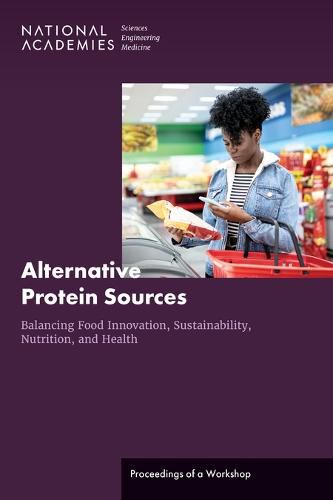Readings Newsletter
Become a Readings Member to make your shopping experience even easier.
Sign in or sign up for free!
You’re not far away from qualifying for FREE standard shipping within Australia
You’ve qualified for FREE standard shipping within Australia
The cart is loading…






Alternative protein sources, which can be derived from plant and animal cells or created by precision fermentation, can have health, environmental, socio-economic, and ethical impacts. With a variety of types of alternative proteins being developed and available on the market, consumers, regulatory agencies, manufacturers, and researchers are faced with many different considerations. The National Academies Food Forum hosted a workshop that took a multi-sector approach to explore the state of the science on alternative protein sources as they relate to issues around diet quality, nutrition, and sustainability. The workshop also examined how alternative protein food processing innovations can be balanced in a way that optimizes nutritional content, affordability, and accessibility. This Proceedings of a Workshop summarizes the discussions held during the workshop.
Table of Contents
Front Matter 1 Introduction 2 Current Protein Challenges 3 Implications for the Industry, Consumers, and Regulators 4 Balancing Innovation in Alternative Protein Processing with Sustainability, Health, Affordability, and Accessibility References Appendix A: Workshop Agenda Appendix B: Acronyms and Abbreviations Appendix C: Biographical Sketches of Workshop Speakers and Planning Committee Members
$9.00 standard shipping within Australia
FREE standard shipping within Australia for orders over $100.00
Express & International shipping calculated at checkout
Alternative protein sources, which can be derived from plant and animal cells or created by precision fermentation, can have health, environmental, socio-economic, and ethical impacts. With a variety of types of alternative proteins being developed and available on the market, consumers, regulatory agencies, manufacturers, and researchers are faced with many different considerations. The National Academies Food Forum hosted a workshop that took a multi-sector approach to explore the state of the science on alternative protein sources as they relate to issues around diet quality, nutrition, and sustainability. The workshop also examined how alternative protein food processing innovations can be balanced in a way that optimizes nutritional content, affordability, and accessibility. This Proceedings of a Workshop summarizes the discussions held during the workshop.
Table of Contents
Front Matter 1 Introduction 2 Current Protein Challenges 3 Implications for the Industry, Consumers, and Regulators 4 Balancing Innovation in Alternative Protein Processing with Sustainability, Health, Affordability, and Accessibility References Appendix A: Workshop Agenda Appendix B: Acronyms and Abbreviations Appendix C: Biographical Sketches of Workshop Speakers and Planning Committee Members